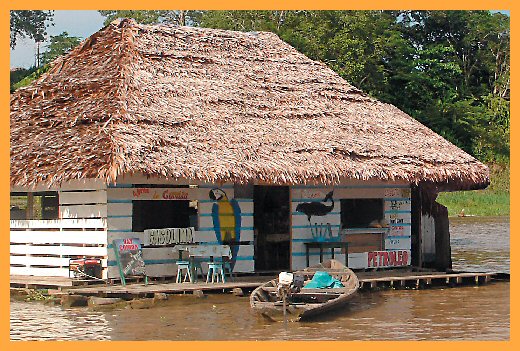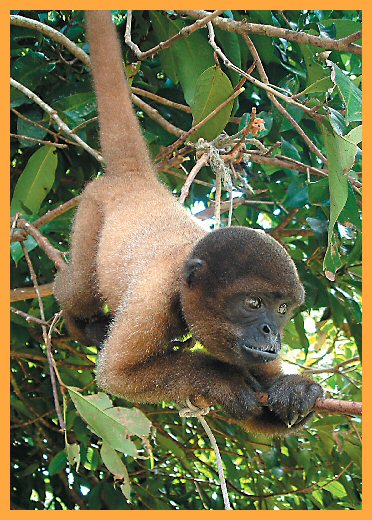 |
|||
 |
|||
 |
|||
 |
|||
 |
|||
 |
|||

by Monica Conrady
![]() ast summer, when
LAN Airlines intro-duced their new direct flight from San Francisco to Lima,
Peru, a travel seed was sown. Come November, we were on our way.
ast summer, when
LAN Airlines intro-duced their new direct flight from San Francisco to Lima,
Peru, a travel seed was sown. Come November, we were on our way.
For most people, Peru means Machu Picchu. In our case, it was not Machu Picchu
but the Amazon that beckoned — a destination long on our travel wish
list.
After spending a few days in Lima to catch our breath, we flew to Iquitos,
Peru’s port city on the upper Amazon and the jumping-off point for jungle
expeditions. Surrounded by rivers and flooded rainforests, Iquitos is reachable
only by plane or, very slowly, by boat. It’s a lively, interesting, somewhat
funky kind of place — steamy hot and humid, but subject to sudden torrential
downpours.
A chance encounter with some other independent travelers led to a 2-night sail down the Amazon to Pevas, a river town on the way to the Colombian-Brazilian border. Our vessel, the Cielito Lindo, a converted river cargo boat — was a bit of a clunker, but with an air-conditioned cabin, private hot shower, good food, and congenial company, we weren’t complaining.
Pevas, founded by missionaries in 1735, has a maze of pathways lined with
thatched, one-room dwellings, a lively market and a couple of bars —
but no automobiles, banks, or internet cafes, and the electricity is on for
only a few hours a day. Francisco Grippa, one of Peru’s best-known artists,
lives and works in Pevas, and his hill-top studio gallery is the town’s
main attraction.
Fish were jumping clean out of the water; one jumped right into our boat by mistake!
After wandering around Pevas, we took a ride in a peque-peque (a motorized
canoe) to visit a nearby Bora Indian village, where we were invited into a
large thatched-roofed hut to watch the women cooking with jungle edibles,
while the village kids crowded the doorway, gazing wide-eyed at us. Later,
well protected with insect repellent, we went on a jungle walk, while along
the way, Charlie, our guide, explained the medicinal uses of various plants.
On our return trip, fish were jumping clean out of the water; one jumped
right into our boat by mistake! A jolly Happy Hour on the deck of the Cielito
Lindo was followed by a farewell dinner; the other guests were heading downstream
the next day, while we were taking a fast boat back to Iquitos.
Once back in town we checked into our hotel, then strolled down to the Malecón,
the riverwalk promenade along the Amazon. Settled at a sidewalk cafe with
a couple of pisco sours — Peru’s national drink — we planned
what to do and where to go before our flight back to Lima three days later.
We booked a day trip with the company, Dawn on the Amazon Tours. It took
just over an hour’s boat ride to Barrio Florido, home of the Fundo
Pedrito (Alligator Farm). There we found a series of small lakes, one
containing several large black caiman.
Another is home to the paiche, the Amazon’s biggest freshwater fish,
which can measure well over 6 feet. We fed these monsters with bits of fish
on a string, which was quite an experience. There were also loads of giant
lily pads, or Victoria Regias, some of which were in bloom.
Back on the river, lunch was followed by a visit to an old-fashioned rum
distillery — with samples!
Early next morning we headed for the huge Belen Market, where along with the
usual rice, beans, and household goods, all manner of weird and exotic products
are sold. Nearby is the floating shantytown of Belen, where the homes are
built on rafts, which rise and fall with the river, depending on the season.
A tour of the Manatee Rescue Center, followed by a visit to the Amazon Golf
Club (yes, really!) completed our time in Iquitos.
Dawn on the Amazon Tours: www.dawnontheamazon.com.
Peru Tourism: www.peru-travel.net;
www.go2peru.com
Return to: Recent articles, Top, Home.

A
Convient Gas Station on the
Amazon River
Monica Conrady photo

A Furry Friend
Monica Conrady photo